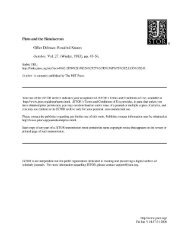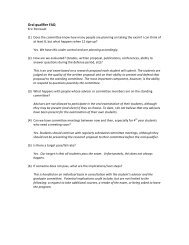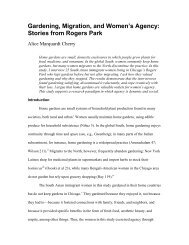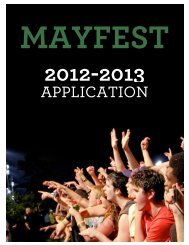research - Associated Student Government, Northwestern University
research - Associated Student Government, Northwestern University
research - Associated Student Government, Northwestern University
You also want an ePaper? Increase the reach of your titles
YUMPU automatically turns print PDFs into web optimized ePapers that Google loves.
RESEARCHment can apply the principle of “reasonable accommodation”to religious and ethnic minorities, under whichit makes some concession as long as the actions of theminority do not conflict with the French identity. 21 TheFrench do not see such a “reasonable accommodation”as a solution to the effects of immigration.The point of the ban on religious articles in schoolsis to make sure that schools function properly and theirprimary purpose (education) is achieved. The StasiCommission Report identifies several other “points oftension” where secularism is not enacted properly and istherefore failing the French public: hospitals, the army,prisons, etc. French spaces should be religion-free soas not to disrupt the public order. The French governmentis in charge of maintaining public order in “sharedpublic spaces.” 22 The idea of French harmony is welldescribed in the microcosm of the workplace: “They[‘employees who wear headscarves and refuse to shakehands with their male colleagues’ and ‘employees donot recognize the authority of managers when it comesto women’] undermine the harmony which must existbetween employees, regardless of their gender and theirreligious and philosophical convictions.” 23 All Frenchcitizens must all be able to interact in a religion-neutralway. Private rights take the backseat to public harmony.Sub-Frame: National UnitySecularism is “a value which is based on nationalunity, as well as a guarantor of individual liberty.” 24 TheStasi Commission openly recognizes the power of theFrench government to unify the French people: “TheState allows the consolidation of common values thatunderpin the social fabric in our country.” 25 This isespecially important in the face of the diversity that immigrantsbring.Our political philosophy was based on the defense of theunity of society. This concern for uniformity outweighsany expression of difference perceived as threatening. Todaydiversity is sometimes presented in a positive light: respectfor cultural rights is claimed by some who view themas an essential aspect of their identity. Preserve culture,belief, memory - real or imagined - is seen as a form ofprotection while participating in a changing world trade.Deny the strength of community feeling would be futile.But the exacerbation of cultural identity can not set itselfin the fanaticism of the difference, carrier of oppressionand exclusion. Everyone must be able, in a secular society,to distance from the tradition. 26The French government must perform the difficulttask of forging unity while respecting the diversity ofsociety. 27Sub-Frame: School as the Birthplace of French CitizensUnder the 1905 law officially separating church andstate in France, “The French state could not allow anyproselytizing in public buildings - least of all schools,where the citizens of tomorrow were being taught.” 28The school is seen as the focus of this debate as theschool is supposed to be a safe learning environmentfor French youth and a place they can pick up Frenchrepublican, not religious, values. It is crucial that “theschool does not become an echo chamber of the passionsof the world, under pain of failing in its educationalmission.” 29 The wearing of conspicuous religioussigns “is enough to disturb the tranquility of schoollife.” 30While many other countries may conceptualize thepublic school as the birthplace of the enlightened andpatriotic citizen but, just as with the concept of secularism,France takes the idea of the school as birthplace ofthe French citizen more seriously…The issue of secularism has reappeared in 1989 where shewas born in the nineteenth century: at school. Its mission isessential in the Republic. It transmits the knowledge, criticalthinking form, ensuring their independence, opennessto cultural diversity, and personal development, educationof citizens as a future career. She prepares tomorrow’s citizenshave to live together within the Republic. Such a missionrequires a clear set of common rules. First of socializationand sometimes only place of integration and upwardmobility, schools have a major impact on individual andcollective behavior. In the school of the Republic are greetednot just users, but for students to become enlightenedcitizens. The school is thus a fundamental institution ofthe Republic, for the most welcoming of minors subject tocompulsory education, to live together beyond their differences.This is a specific area, subject to specific rules so as toensure that the transmission of knowledge in serenity. Theschool must not be sheltered from the world, but studentsmust be protected from the ‘fury of the world’: it certainlyis not a sanctuary, but it must encourage a distancing fromthe real world to enable learning. Yet in too many schools,the evidence showed that identity conflicts can become asource of violence, result in violations of individual freedomsand cause public disorder…. For the entire schoolcommunity, the veil is too often a source of conflicts, divisionsand even suffering. The character of a visible religioussign is perceived by many as contrary to the mission of theschool to be a neutral and a place of awakening of criticalconsciousness. It also undermines the principles and valuesthat schools should teach, including equality between menand women. 31This quote reveals how seriously the conceptionof the French citizen-student resonates with the StasiCommission. It also shows how the French school as thebirthplace of good citizens relates to the integration ofimmigrants (as well as the flipside of diversity and multiculturalism)and the process of “social mixing.”The ideal French school is characterized as a placetotally free of religion…The secular state that guarantees freedom of conscience,in addition to freedom of religion or of expression, protectsthe individual and allows everyone to freely choosewhether or not an option spiritual and religious, to changeor be waived. It ensures that no group, no communitycan impose on anyone a membership or religious identity,especially because of its origins. It protects each and everyone against any pressure or entity, carried out under coverof a particular spiritual or religious prescription. The freedomof individual conscience against proselytism is nowcomplete separation of the notions of neutrality and powerin the 1905 Act. 3254 NORTHWESTERN UNDERGRADUATE RESEARCH JOURNAL











